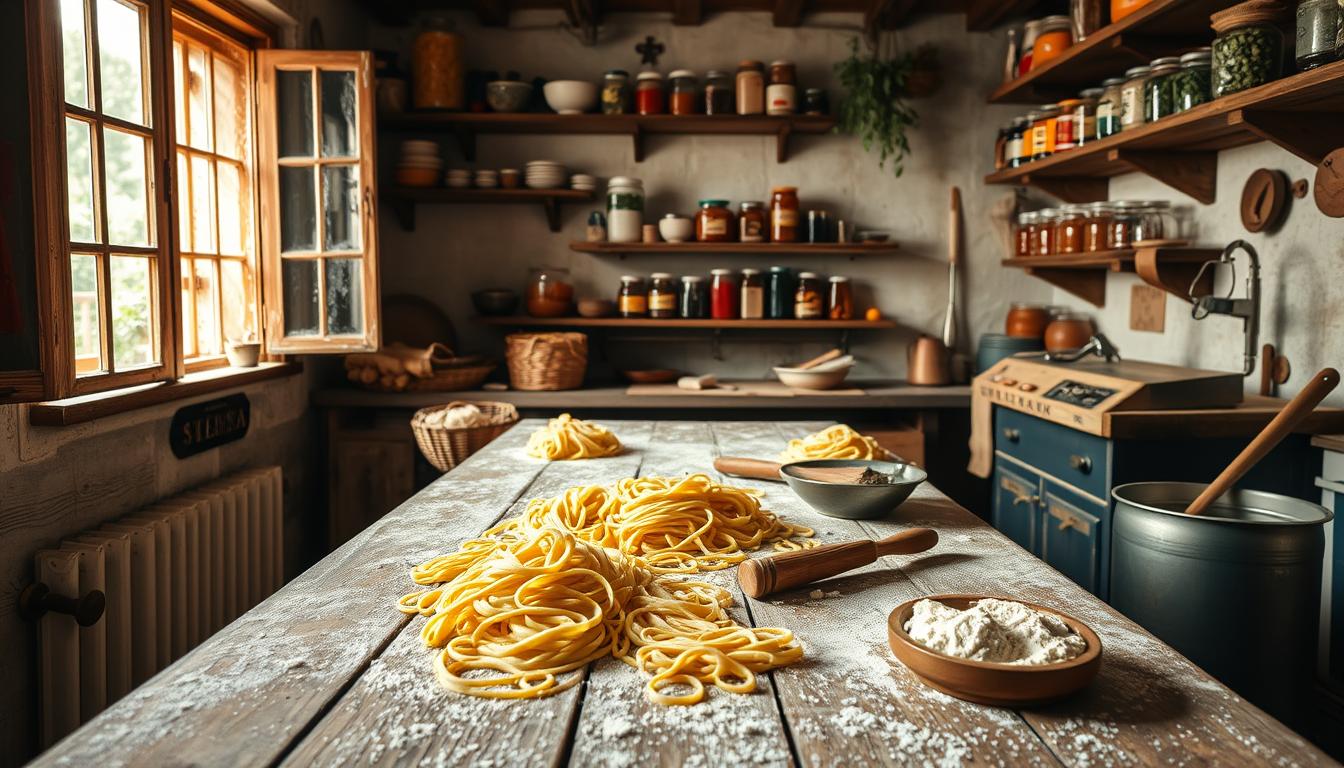Starting a homemade pasta business in Italy can be very rewarding. It’s a great way to connect with Italy’s rich food culture. With more people wanting artisanal foods, knowing how to get a pasta business license is key.
This guide will help you understand the steps to start your business. You’ll learn about the local market, legal needs, and how to follow the rules. We aim to give you the tools to make your pasta business a success.
Key Takeaways
- Understanding the market potential for homemade pasta in Italy.
- Importance of obtaining the correct pasta business license.
- Steps to ensure compliance with local food selling regulations.
- Insights into the growing demand for artisanal food products.
- How to effectively navigate the licensing process for selling food in Italy.
Understanding the Homemade Pasta Market in Italy
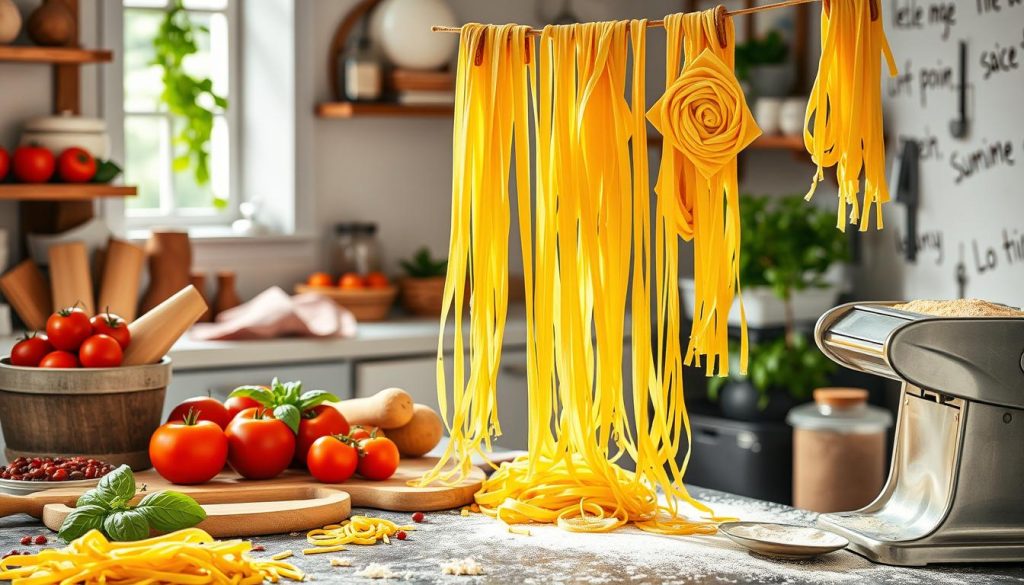
The homemade pasta market in Italy shows a strong love for traditional food. Artisanal skills and local ingredients make products more appealing. Recent studies show a big move towards homemade pasta over mass-produced ones.
People now value homemade pasta for its quality and real taste. They look for locally-sourced ingredients and unique flavours.
Today, there’s a big interest in different pasta shapes and flavours. Organic and gluten-free options are especially popular. Each region in Italy has its own pasta types and recipes, matching local tastes.
Seasonal trends also play a big part. Some pasta dishes are more popular during certain months, especially around festivals and holidays.
Knowing these trends opens up great chances for new sellers in Italy’s food market. By using traditional methods and keeping quality high, newcomers can stand out. They can attract customers who want to support local food makers.
Telling stories about where ingredients come from and how pasta is made can also help. It makes a brand more relatable and appealing to consumers.
Legal Requirements for Selling Food Products
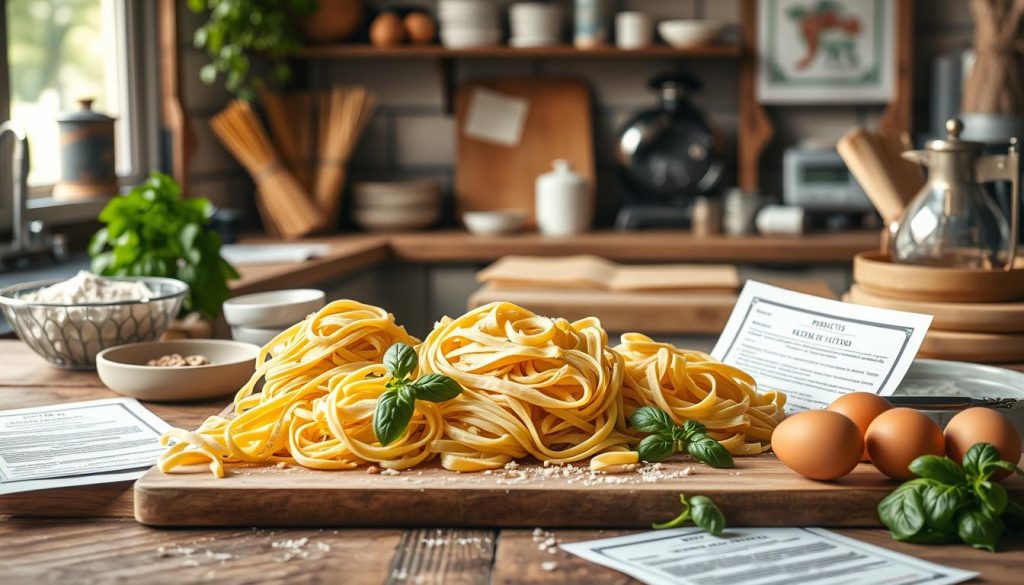
Selling food in Italy means dealing with a lot of rules. It’s important to know these rules well. You need health permits, which change depending on where you are. You also have to register with local authorities to follow the law.
Keeping food safe is a big deal. Italy sticks to strict EU rules for food safety. Following these rules helps avoid legal trouble and keeps customers happy and safe.
To run a homemade pasta business, you need to:
- Get the right health permits from local health departments.
- Register your business with the right agencies.
- Keep records that show you follow food safety rules.
Following these rules helps your business grow. It builds trust with customers in Italy’s food market.
How to Get a License to Sell Homemade Pasta in Italy
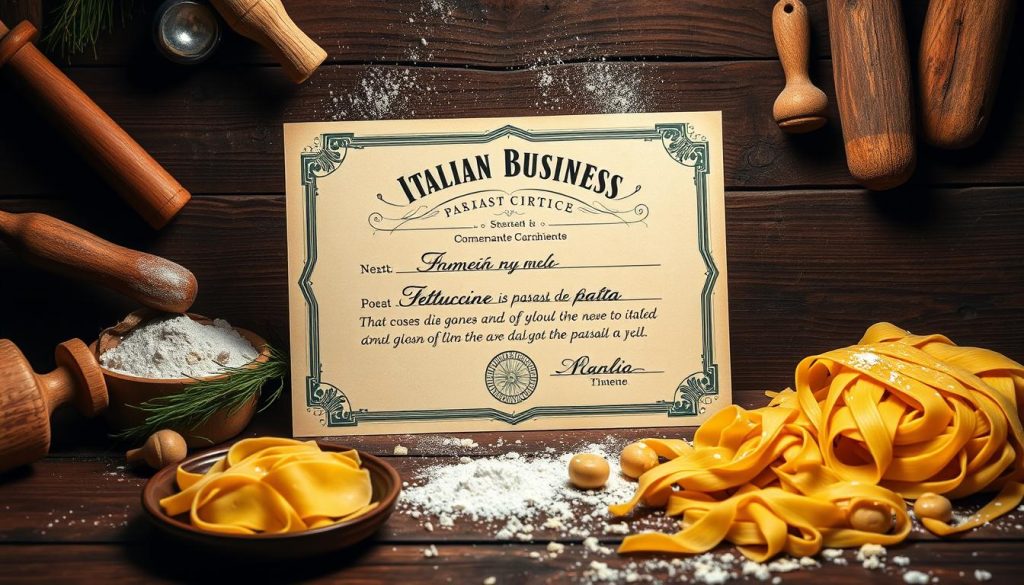
To start a homemade pasta business in Italy, you need a pasta business license. This ensures you follow all the rules. You must know about the different licenses available and the documents needed to show you meet food safety standards.
Types of Licenses Required
There are several licenses for selling homemade pasta. The main ones are:
- Artisanal Food Business License: This is key for selling food products like pasta.
- Local Municipal Permits: These are needed based on the local area’s rules.
Documentation Needed for Application
When applying for a pasta business license, you need certain documents. These include:
- Health Certificates: These prove you handle food safely and hygienically.
- Kitchen Inspection Reports: They check if your kitchen meets health standards.
- Ingredient Sourcing Evidence: This shows where and how you get your ingredients.
Choosing the Right Location for Your Pasta Business
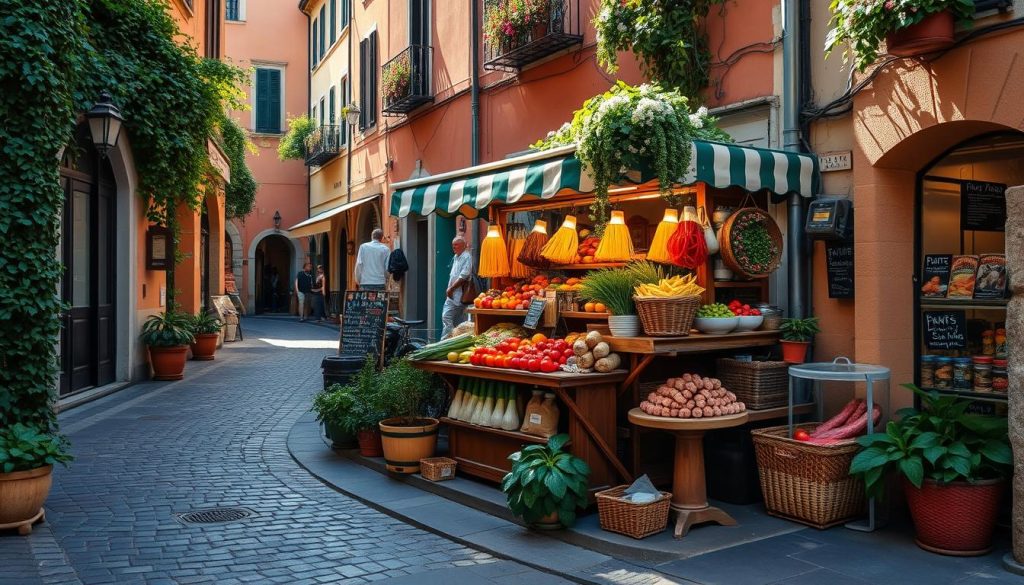
Choosing the right spot for your pasta business is key to success. Many factors influence your reach and sales. Important things to think about include:
- Foot Traffic: A busy area means more people see you and might buy on the spot.
- Accessibility: Make sure it’s easy to get to by public transport and has good parking.
- Nearby Competition: Check out other food places nearby. Too many might make it hard to stand out.
- Local Demographics: Know who lives nearby. This helps you decide what to sell and how to market it.
Urban and rural areas have their own benefits for a food business. Cities have more people and potential sales. But, rural spots might attract fans of handmade goods. Think about what’s best for you.
Also, finding a commercial kitchen is crucial. Pick a place known for its food culture, especially pasta. This boosts your brand and connects you with locals.
Packaging and Labelling Regulations
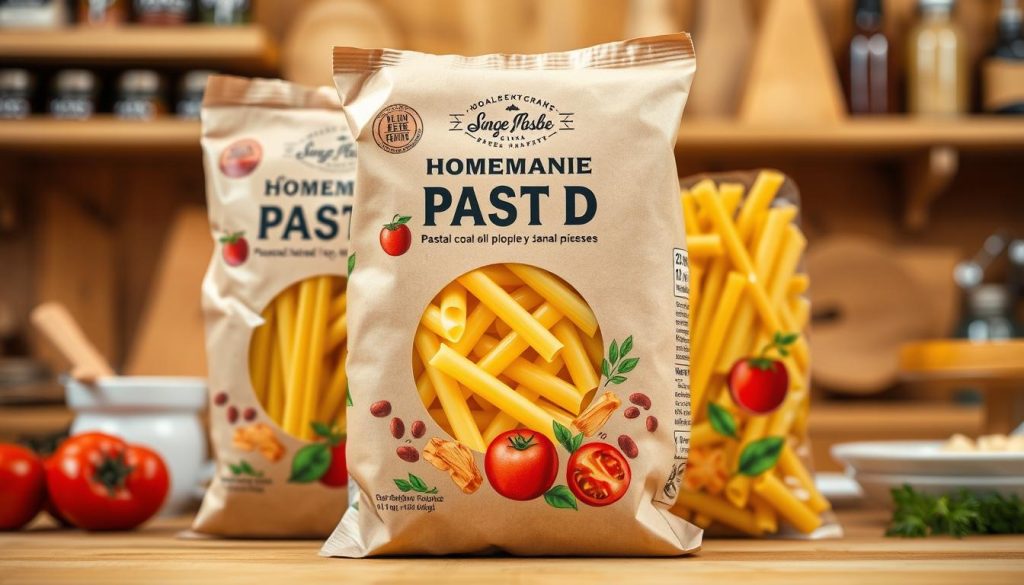
Understanding food packaging rules is key for selling homemade pasta in Italy. You must follow labelling standards Italy has set. This means all important info must be clear on the packaging. The list of ingredients must be full, with allergens clearly shown to protect health.
It’s also important to include nutritional information. This lets buyers make better choices. Being open about what’s in your pasta can build trust and make it more appealing.
Sustainability is big in pasta packaging today. Using eco-friendly materials can make your product stand out. Here are some tips for packaging:
- Use designs that grab attention.
- Add QR codes for more info, like recipes.
- Make sure packaging keeps the pasta safe during shipping.
Following food packaging rules is not just about safety. It also helps your brand’s image. If you make pasta at home, always check the latest rules. This keeps you in line and ready for any changes.
Health and Safety Standards for Food Production
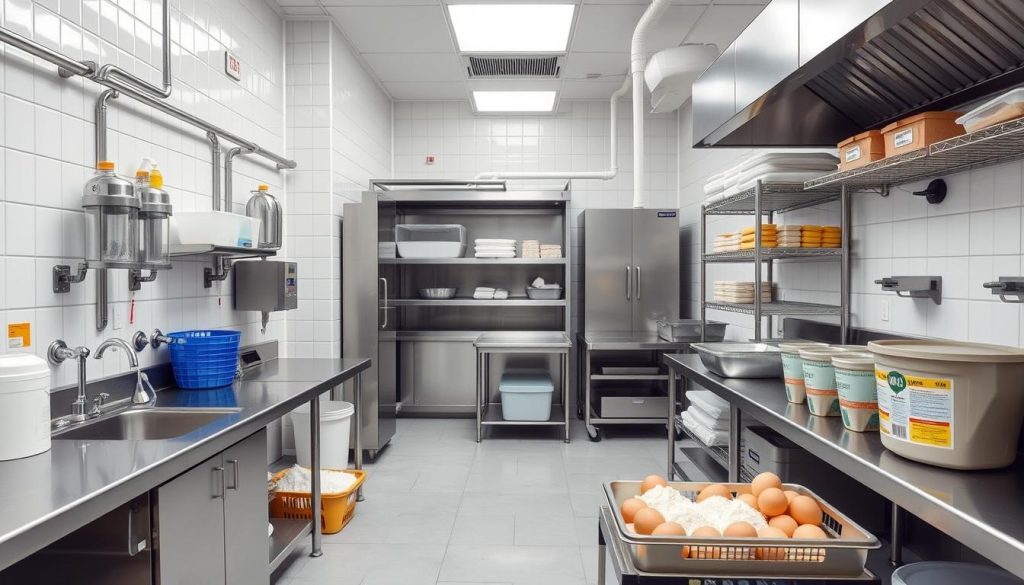
Keeping food health standards high is crucial for homemade pasta makers. They must follow rules to ensure their products are safe and of good quality. Knowing these rules is key for anyone in the food industry, especially in Italy.
Sanitation Requirements for Home Kitchens
Sanitation is key in home kitchens to meet food health standards. If you make pasta at home, you must follow strict hygiene rules. Here are important points to remember:
- Make sure surfaces are clean and sanitised before you start cooking.
- Use only food-grade materials and utensils to prevent contamination.
- Keep ingredients, especially perishable ones, in the right storage conditions.
- Follow personal hygiene rules, like washing hands often and wearing clean clothes.
- Check that appliances and tools are clean and work well.
Following these sanitation rules helps keep food safe in Italy. It also keeps customers healthy. Knowing local health rules helps make your pasta business successful and respected.
Creating a Business Plan for Your Homemade Pasta

Creating a solid business plan is key to success in the homemade pasta market. It outlines important parts for starting and growing your business. This includes market and competitive analysis.
Understanding your industry is crucial. It helps you know what customers want and what trends are coming. This knowledge is the foundation of your market analysis.
Doing a deep dive into your competitors is essential. Look at their strengths and weaknesses. Find out how you can be different with your homemade pasta.
Being different is important. Maybe it’s because of the quality of your ingredients, unique flavours, or how you present your pasta.
Financial planning is also vital. You need to estimate how much money you’ll need at the start, what it will cost to run your business, and how much you might make. This helps set achievable goals and prepares you for surprises.
Highlighting what makes your pasta special is important. What will draw in your customers? Make sure you explain this well. It will help your brand stand out in a crowded market.
Also, talk about how you plan to make and sell your pasta. Include your production process, how you’ll get your pasta to customers, and your marketing plans.
- Conduct detailed market and competitive analysis.
- Define product offerings with distinctive qualities.
- Prepare financial forecasts and investment plans.
- Identify your unique value proposition.
- Outline operational strategies for efficient production and marketing.
Marketing Your Homemade Pasta
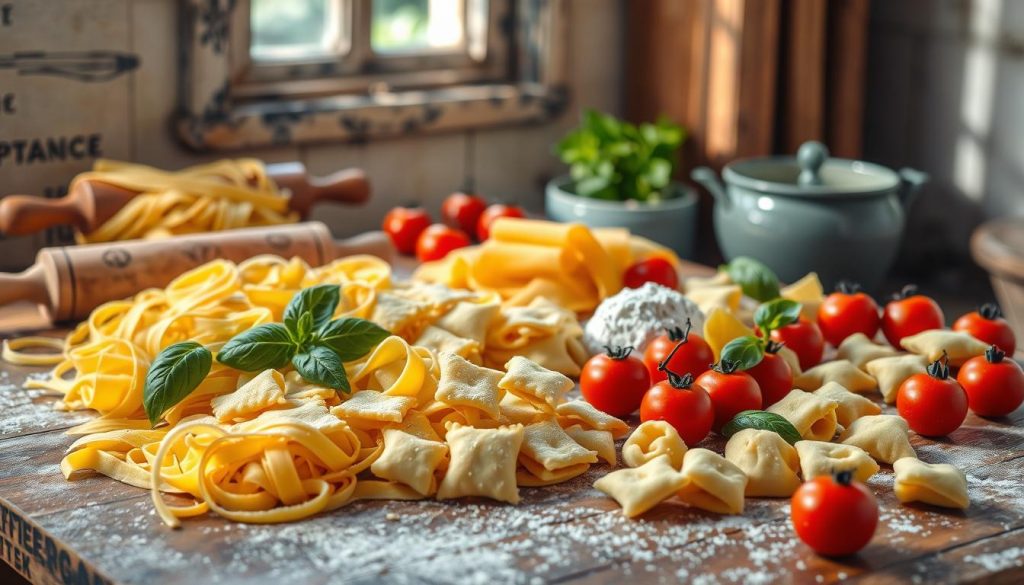
Effective marketing is key to promoting homemade pasta. Having an online presence helps people find and connect with your brand. A professional website is a great start, showing off your unique pasta and sharing important details.
Building an Online Presence
A good website makes browsing easy and attracts more visitors. Using digital marketing, like SEO, helps you rank higher in searches. Keep your site fresh with new blogs and recipes to keep people coming back.
Utilising Social Media for Promotion
Social media sites like Instagram, Facebook, and TikTok are great for reaching more people. They let you share beautiful pasta dishes and cooking videos. Use stories, polls, and posts from others to build a loyal fan base. Targeted ads can also help boost your sales and brand recognition.
Understanding Tax Obligations for Small Food Businesses

Understanding taxes for small food businesses in Italy is key. It ensures you follow the rules and keeps your business healthy financially.
Key areas of focus include:
- Value Added Tax (VAT): It’s important to know how VAT affects your food products. Rates can change based on what you sell.
- Income Tax: Your business profits will be taxed. Keeping good financial records is crucial for reporting.
- Potential Deductions: Knowing what you can deduct can lower your taxes. Costs like ingredients, equipment, and marketing might count.
Learning about local and national tax rules helps with food business taxes in Italy. Staying on top of paperwork and deadlines is vital for small businesses.
Finding Suppliers for Quality Ingredients
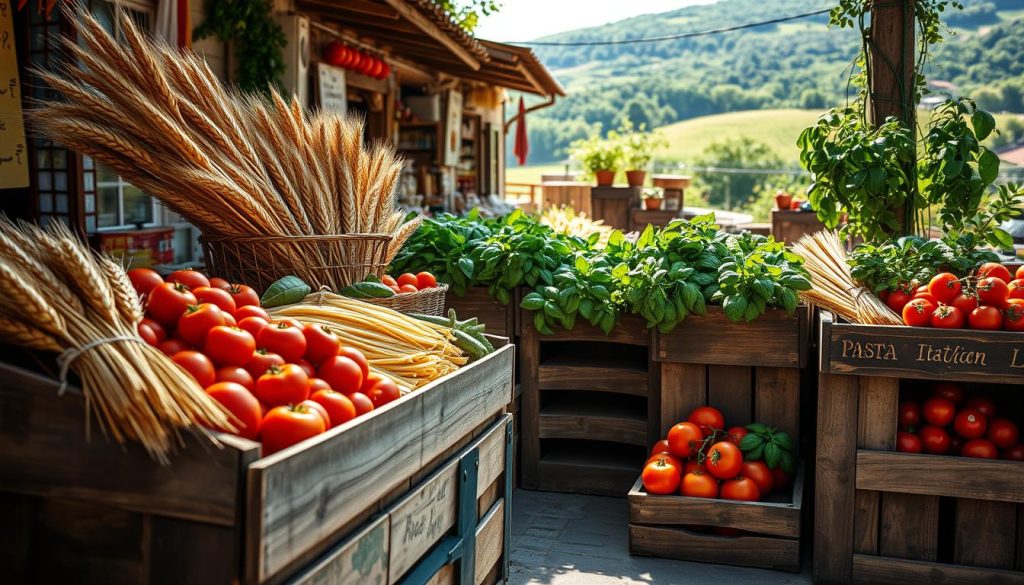
Finding the right ingredients is key for any pasta business. The right mix can make your pasta stand out. You can choose from local or organic suppliers. Knowing the difference helps you pick what’s best for your brand and customers.
Local vs. Organic Ingredients
Choosing between local and organic ingredients depends on several things. Cost, quality, and how green they are are important. Local suppliers give you fresher products and help the local economy. But organic might be better for those who care about health and the planet.
- Local Ingredients: Often fresher and can be sourced quickly.
- Cost-effective: Generally more affordable due to lower transportation costs.
- Community Support: Encourages local economies and builds consumer trust.
- Organic Ingredients: Typically free from synthetic pesticides and fertilisers.
- Quality Assurance: Often associated with higher production standards.
- Market Appeal: Attracts consumers prioritising health and sustainability.
Good relationships with suppliers mean better ingredients over time. Working with local farmers or organic producers can make your brand more appealing. Think about how your choice affects your pasta’s quality and appeal.
Navigating Italian Culinary Traditions and Regulations
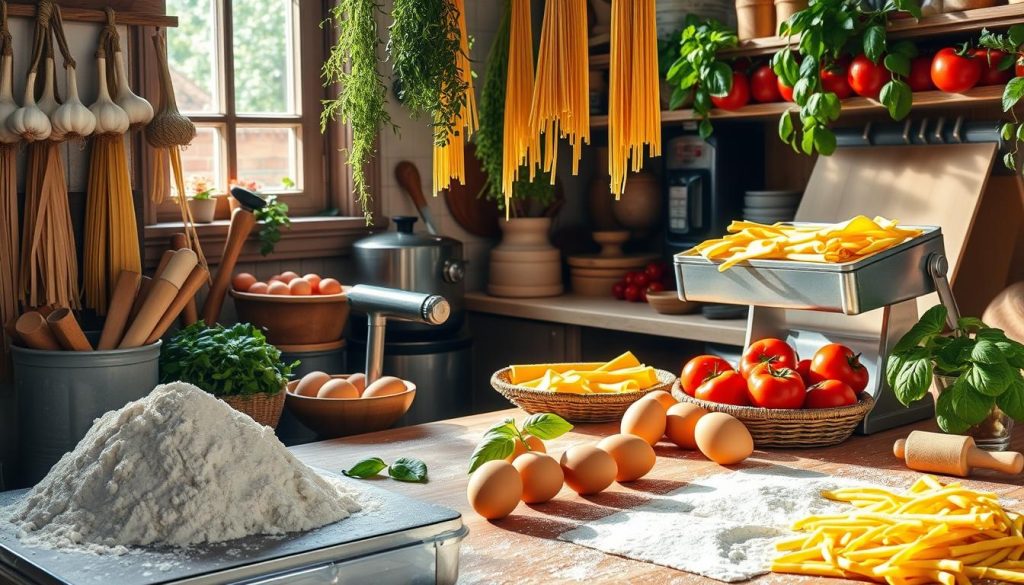
For those wanting to make homemade pasta in Italy, knowing the culinary traditions is key. Pasta is deeply rooted in history and culture, showing the variety of regions it comes from. By following these traditions, homemade pasta makers add real value to their products. This connects with people who love food heritage.
It’s also important to understand the rules for making food. Italy has strict rules to keep traditional methods and quality high. The Protected Designation of Origin (PDO) is a big part of this. It protects certain foods, making sure they meet certain standards.
Following these rules builds trust with customers. It helps homemade pasta businesses grow. And it keeps Italy’s rich food history alive. By sticking to these traditions and rules, makers not only respect the past. They also have a bright future in the food world.
Networking in the Food Industry
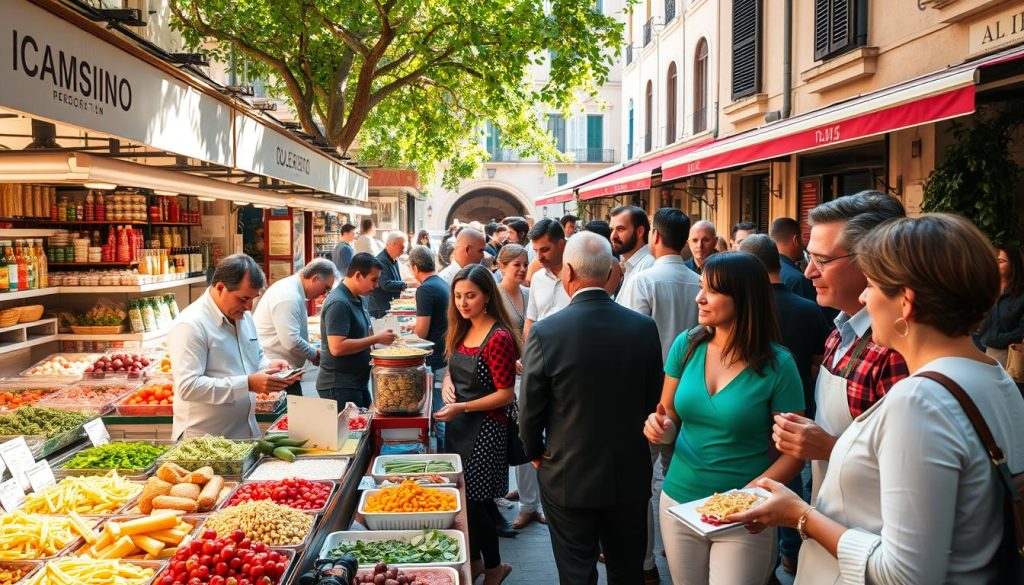
Building strong relationships in the food industry is key to success. Networking opens doors to new opportunities. It helps grow your business by connecting with suppliers, chefs, and other entrepreneurs.
One great way to grow your network is by joining local food events. These events are perfect for sharing ideas and resources.
Participating in Local Food Fairs and Festivals
Local food fairs and festivals are great for showcasing your homemade pasta. They let you meet potential customers and get feedback. This boosts your brand and keeps you updated on market trends.
Meeting other vendors can lead to collaborations and referrals. Here are some opportunities to consider:
- Display and promote your unique homemade pasta creations.
- Network with other food producers and local chefs.
- Gather customer insights to refine your offerings.
- Learn from the experiences of seasoned professionals in the food industry.
- Establish long-term relationships that could lead to future partnerships.
Using these local food events is crucial for building a strong network. It will support your business in the food sector.
Customer Feedback and Quality Control
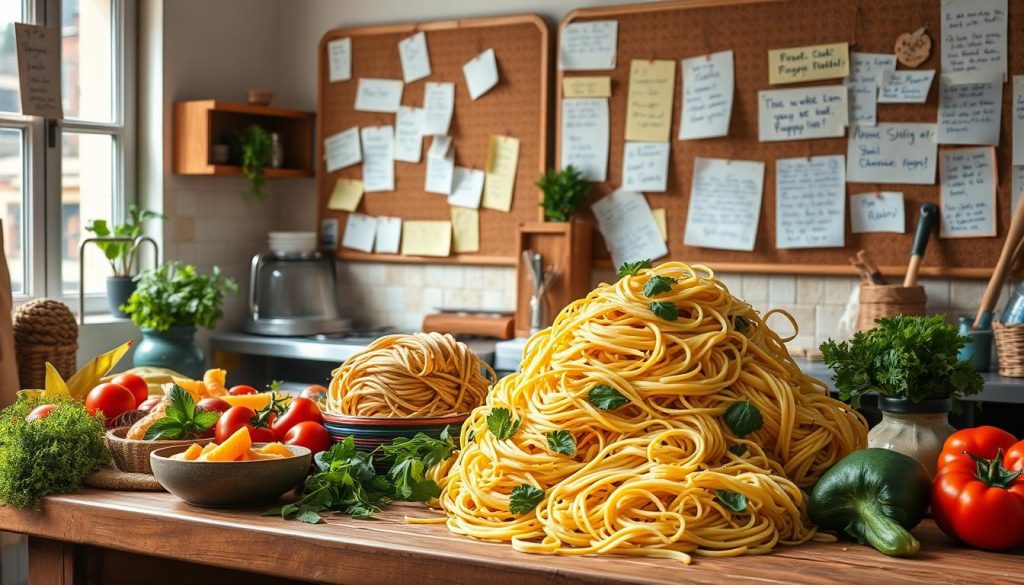
Customer feedback is key for growth in any food business, especially in homemade pasta. Using effective feedback methods gives valuable insights into what customers like and what can be improved. Surveys, social media, and in-person tastings are great ways for customers to share their opinions.
Having strong quality control for pasta ensures taste and packaging are always good. Regular checks on ingredients, cooking, and final products keep standards high. Also, using customer feedback helps improve your pasta, making sure it meets changing tastes and needs.
Using customer feedback well builds strong loyalty and improves your reputation. Being quick to respond to customer needs keeps your products competitive and ensures long-term success.
Expanding Your Homemade Pasta Business
As your homemade pasta business grows, it’s key to think about how to expand. One good way is to offer more products, like sauces or ready-made meals. This can attract more customers and help you grow your market share.
Another great way to grow is by working with local restaurants and shops. By partnering with them, you can sell more and get your brand seen by more people. Look for places that share your values, like organic or artisanal spots, and make a strong case for why they should use your pasta.
Don’t forget about the practical side of getting bigger. You’ll need better equipment and skilled workers to keep up quality. If you’re really ambitious, you could even franchise your pasta business. These steps will help your pasta business keep growing and improving.

